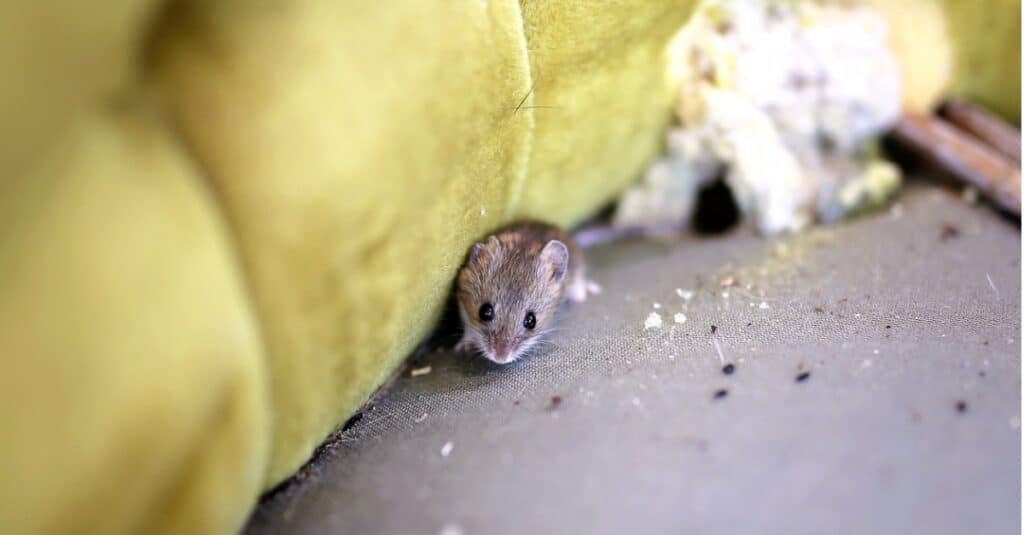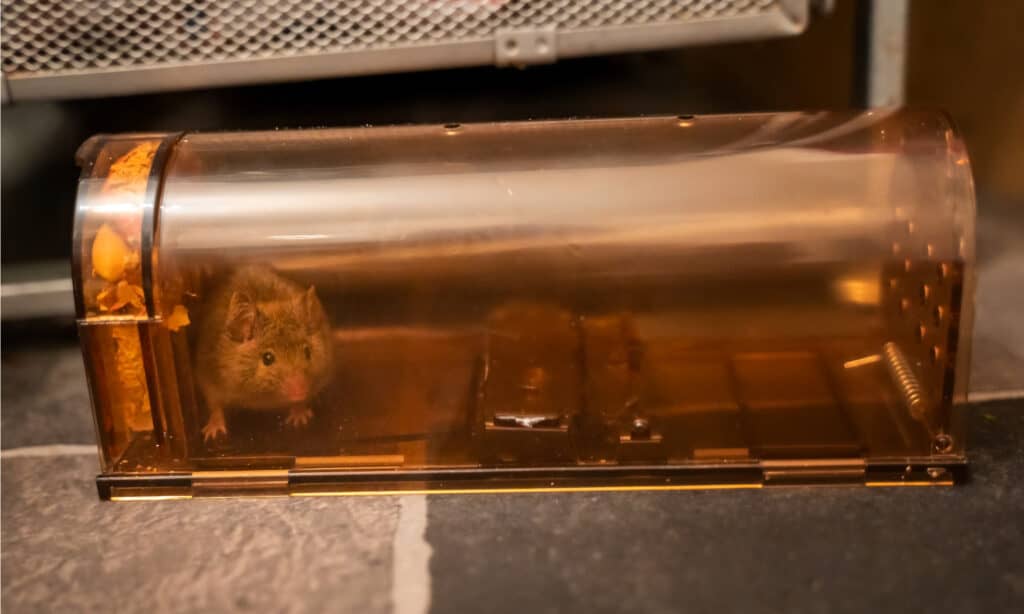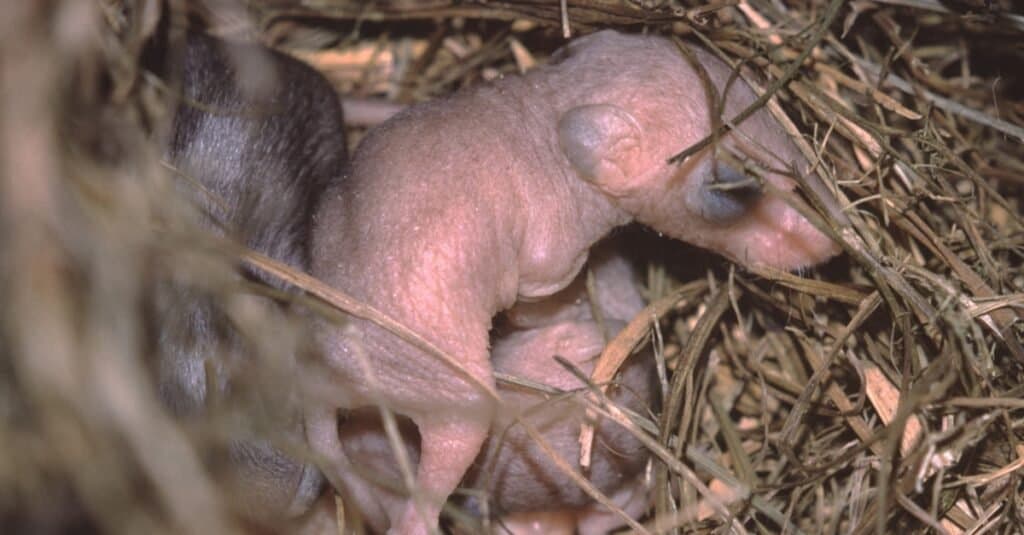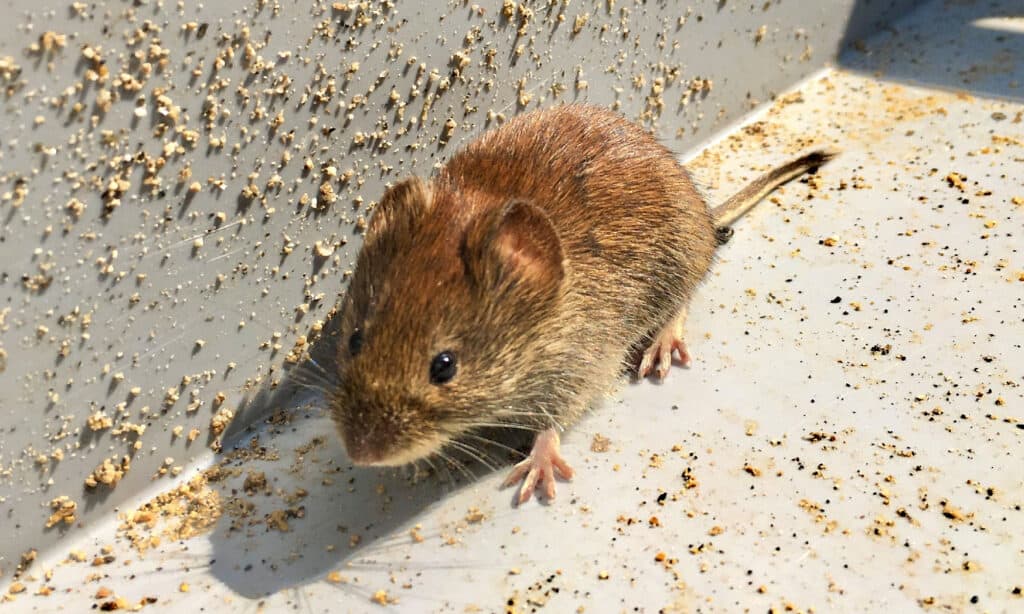Your garage is a sanctum where you store tools, work on cars, and set up a weight bench to use once in a while. However, pests like mice are attracted to these outbuildings because they offer protection against the elements, some privacy from humans and predators, products they can use for tools, and more. The last thing you want is pests like mice in your garage.
Now, some of you might be thinking, what’s the big deal if I have mice in my garage? Mice are more capable of doing damage than you realize. That’s why we’re going to show you why you don’t want mice in your garage and how you can get them out of the building.
Why You Don’t Want Mice in Your Garage

Mice are cute, but they can do some serious damage.
©iStock.com/ChristinLola
You may be thinking, what’s the harm in having a mouse in your garage? The truth is that mice are a lot more insidious than their tiny squeaking nature may imply. For example, mice may:
- Chew apart your paper products
- Damage your electrical wires
- Eat any food or pet food
- Leave disease-ridden urine and feces
Let’s start with the physical damage that mice can do. Mice like to chew, gnaw, and claw their way into different places.
Mice can chew their way into your garage and then start tearing up the stuff inside for nesting materials. Shop towels and cardboard will be torn to shreds, and they’ll get into your bags of pet food. Worse yet, mice love to chew on wires that they find. That could be the wires to your hanging lights or even those in your car if it’s parked in the garage.
Some people use their garage to store excess food and drinks, too. Mice will find a way to eat that food as well.
Mice are very messy creatures that defecate and urinate as they wander around throughout the day. Their urine and feces can both transmit deadly diseases to humans, including hantavirus and hemorrhagic fever! You can come into contact with mouse droppings and urine without knowing it.
These are all things you want to avoid having in your garage.
How Do You Know If You Have Mice in Your Garage?

The presence of mouse nests indicates you have a mouse infestation.
©Adrian Eugen Ciobaniuc/Shutterstock.com
You may be wondering how to tell if you have mice in your garage. The telltale signs are obvious, and they include:
- A stale ammonia smell from mouse urine
- Torn pieces of paper towels, cloth, grass, or other nesting items
- Mouse droppings
- Mouse nests that appear as bushy, circular nests of 3-6 inches in diameter
- Food containers that have been chewed into and/or have food missing from them
These are all signs that you have mice living in your garage. If that’s the case, you need to implement a plan to get the mice out of your garage.
What to do if You Have Mice in Your Garage

You need to get mice out of your garage using harsh methods.
©Rudmer Zwerver/Shutterstock.com
If you have mice in your garage, you need to lay baited snap traps, fill in any holes with cement or cover them with metal, properly lock up and conceal food, and clear away all the brush from around the garage.
Mice want to be in your garage because it offers them safety from weather and predators, materials to build nests, and food. You have to deny them access to your garage using these processes.
1. Seal up the Garage
First and foremost, you have to check all over your garage for holes, small gaps, and other ways they’re getting inside. While mice have bones, their skeletal structure is very flexible, allowing them to get into gaps with the diameter of a dime.
It’s not enough to caulk those holes in some cases. Mice will scratch and gnaw their way inside. You need to add a material they cannot get through like steel wool behind caulk, sheet metal, or cement. After you are absolutely sure that your garage is sealed, move on to the next step.
2. Place Traps in the Garage

Traps can be a safe and humane solution to dealing with unwanted mice.
©lortek/Shutterstock.com
You need to load your garage with traps. Get snap traps and bait them with peanut butter, commercial bait, or other foods that mice enjoy. Put them along the walls and in dark recesses where you have seen mice or their nests.
These traps will instantly kill the mice, and then you can dispose of them. They aren’t the only type of traps available, but they’re cheap and incredibly effective. You may also want to use electric traps and glue traps, too. You can use humane traps and release the mice, but it won’t stop a severe infestation.
3. Move or Properly Seal Food
If you have food in your garage and you don’t go into it often, you’re inviting mice into the building. You can stop mice from getting into food by putting it into a plastic or metal container that they cannot get into.
Don’t leave cardboard containers of cereal or other food products out in the garage until you’ve sealed off the building.
4. Remove Brush, Add Barriers
Don’t give mice the cover they need to work their way into your building. Cut down the tall grass around your garage, so they don’t feel comfortable standing in the open. Also, use scents to keep them from coming around the building, like peppermint oil.
5. Get Rid of Any Nests You Find

Getting rid of nests is hard but necessary.
©Liz Weber/Shutterstock.com
Lastly, you need to get rid of any mouse nests in the garage. As cruel as it may seem, that means exterminating the old and young mice and burning the nest. You need to wear gloves, a mask, and goggles when disposing of the nest, and then you need to clean the area with bleach to get rid of the bacteria.
By following all these steps, you can get rid of the mice in your garage. That way, you can reclaim your space and ensure you don’t put yourself at risk for diseases or foster an infestation that could lead to your home.
If you think that you don’t have what it takes to end the infestation, don’t be afraid to get some help from professional exterminators.
Is it normal to have mice in your garage?

Mice tend to look for warm places to come indoors during colder months.
©iStock.com/Bruno_il_segretario
Have you seen any of these little critters running around your garage or other parts of your house? Try There are actually several reasons why finding mice in your garage should not surprise you too much.
Just like any other mammal that needs to keep warm, mice will start searching for a place to build their nest when the temperatures outside start dropping low. Garages make a good spot for mice to settle into because they are towards the outer perimeter of houses and probably areas that do not see much homeowner activity except for pulling vehicles in and out.
The majority of garages are also not the tidiest room in a house. Boxes, totes, tools, benches, and all sorts of manner of items create a clutter that makes a multitude of hiding places to allow mice to move in and out with some feeling of security.
Finally, being indoors protects mice from predators, like owls and cats, by giving them shelter overhead.
The photo featured at the top of this post is © CezaryKorkosz/Shutterstock.com
Thank you for reading! Have some feedback for us? Contact the AZ Animals editorial team.






